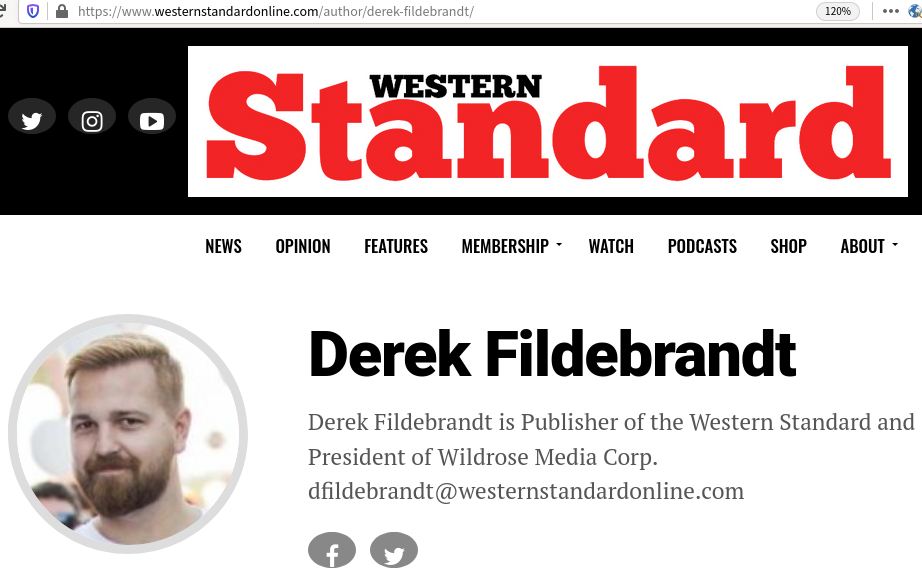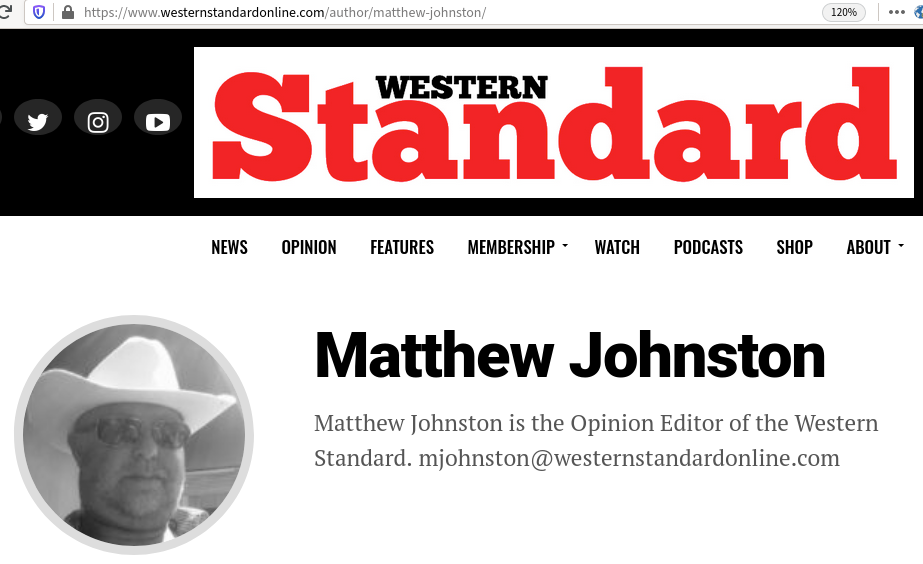The Western Standard is an Alberta based news and commentary website. It was founded in 2004 by right-wing media personality Ezra Levant as a printed magazine, stopping publication in 2007. In 2019, Derek Fildebrandt bought the rights to the Western Standard and relaunched it.
-
Derek Fildebrandt, Publisher, Western Standard and President of Wildrose Media Corporation.
[Image source. Click image to open in new window.]
History
Although 20% of the Western Standard's readership was in Ontario, the former motto of the Western Standard was "the independent voice of the new west," and its editorial voice expressed sympathy to Western Canadian issues. This was manifested in greater reporting coverage of Western problems, and a roster of opinion editorial voices calling for a remediation of same. In fact, a plurality of the Western Standard's columnists live in Central Canada, including David Warren, Michael Coren and Karen Selick, or in the Eastern U.S., including Walter E. Williams and Mark Steyn.
The Western Standard was openly critical, in its reporting and opinion columns, of policies it believed favour Central Canada, such as the Canadian Wheat Board, what it argued is the disproportionate allocation of Parliamentary seats to Central and Eastern Canada, and official bilingualism. The Western Standard also published an opinion editorial by Ric Dolphin whose frequently criticized Quebec and its politics -- though Western and conservative politicians were not spared by him, either.
Several of the Western Standard's columnists, including Warren have argued for Alberta's secession. Other Western Standard writers, such as Andrew Coyne, have argued strenuously against it, and former editor Kevin Libin has written skeptically on the subject.
Libertarianism
Despite being primarily conservative, the Western Standard also has some libertarian policies influence. Ontario lawyer and columnist Karen Selick argued with social conservative television host Michael Coren in a debate column on current public policy issues called Face-off; Edmonton-based National Post columnist Colby Cosh authored the sports column; and Matthew Johnston was the Western Standard's Senior Vice-President.
All four -- Selick, Williams, Cosh, and Johnston -- are known for their libertarian political views.
The Western Standard was purchased by Matthew Johnston in 2008. Since then, the e-magazine has been more openly libertarian, with Johnston stating that in December 2008 that "at the Western Standard, we aim to be fiercely and openly loyal to libertarian ideas without being partisan."
-
Matthew Johnston, Opinion Editor, Western Standard.
[Image source. Click image to open in new window.]
Muhammad cartoons controversy
On February 13, 2006 the Western Standard attracted controversy when it became the first widely published English Canadian media outlet to republish the cartoons of Muhammad first published by the Danish newspaper Jyllands-Posten. Conservative Defence Minister Gordon O'Connor criticized this decision, saying that it put the lives of Canadian soldiers in Afghanistan at increased risk. While editors of Canadian news media decided against publishing the cartoons, a subsequent poll of Canadian journalists conducted by Compas [a Canadian polling company, also known as CMI/Compas (CrossMedia Inc.)] found that 7 in 10 of respondents thought that at least some of the cartoons should have been published by at least some of the Canadian media.
Retail bookselling giant Chapters and Indigo refused to stock this particular issue of the Western Standard.
On February 23, 2006, Gordon Wong, Calgary's Crown Attorney decided against laying hate charges against the Western Standard. Wong felt that there was no evidence the publication intended to incite hatred against a specific group. "The intent was to debate the issues within the articles," Wong told The Toronto Star. "That's different than inciting hatred."
In February 2006, Calgary Muslim leader Syed Soharwardy filed a human rights complaint against Western Standard publisher Ezra Levant. Ezra Levant was compelled to appear before the Alberta Human Rights Commission to discuss his intention in publishing the cartoons. Levant posted video of the hearing on YouTube. Levant questioned the competence of the Commission to take up the issue, and challenged it to convict him, "and sentences me to the apology," stating that he would then take "this junk into the real courts, where eight hundred years of common law" would come to his aid. In February 2008, Soharwardy dropped the complaint noting that "most Canadians see this as an issue of freedom of speech, that that principle is sacred and holy in our society."
In May 2006, the Edmonton Council of Muslim Communities filed another Human Rights complaint against the Western Standard over the publishing of the cartoons. In August 2008, the Alberta Human Rights and Citizenship (AHRC) Commission dismissed the complaint, the commission stated that, "given the full context of the republication of the cartoons, the very strong language defining hatred and contempt in the case law as well as consideration of the importance of freedom of speech and the 'admonition to balance,' the southern director concludes that there is no reasonable basis in the information for this complaint to proceed to a panel hearing."
Following the dismissal of the complaint, Levant blasted the AHRC, stating that "I should have the right to publish even if a second-rate bureaucrat does not approve it" and that the power of the commission to investigate complaints and potentially restrict freedom of speech "is a huge problem not just for me, but for every journalist in the country." Levant stated that he had to spend over $100,000 in legal bills, none of which was reimbursed, while the Edmonton Council of Muslim Communities did not pay any costs. Levant also noted that the AHRC's 900-day investigation cost to taxpayers is $500,000.
Levant sharply criticized the AHRC, stating Levant also suggested that the only reason the commission dropped the case was because of the bad publicity it had spawned. "I could afford lawyers and take it to the Supreme Court and beat up on the Human Rights Commission. That's why I was let go. They were worried about the daily PR beating they were taking." Ezra Levant also stated that it is "unconstitutional for a government bureaucrat to look through my Western Standard and say what I can or cannot publish."
End of the Western Standard
On October 5, 2007, the publisher of the Western Standard, Ezra Levant, announced that the Western Standard would cease the distribution of its non-electronic version because of financial difficulties. Levant sold the publication's remaining assets to Matthew Johnston. Subscribers were given a trial subscription for Maclean's magazine.
Relaunch in 2019
Johnston sold the Western Standard to Derek Fildebrandt, and on October 21st, 2019, Fildebrandt relaunched it with a new online focus.
Additional Reading
Return to Persagen.com

